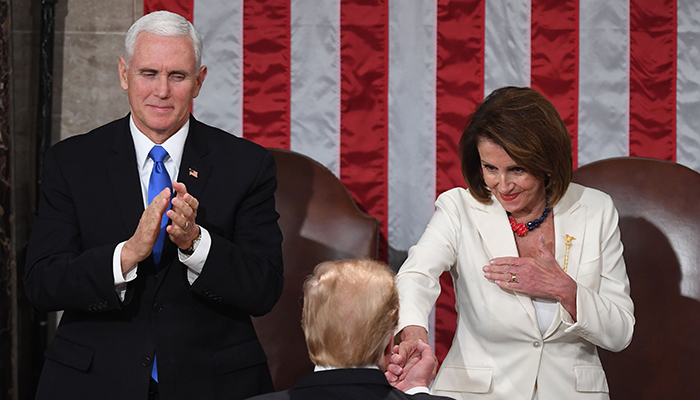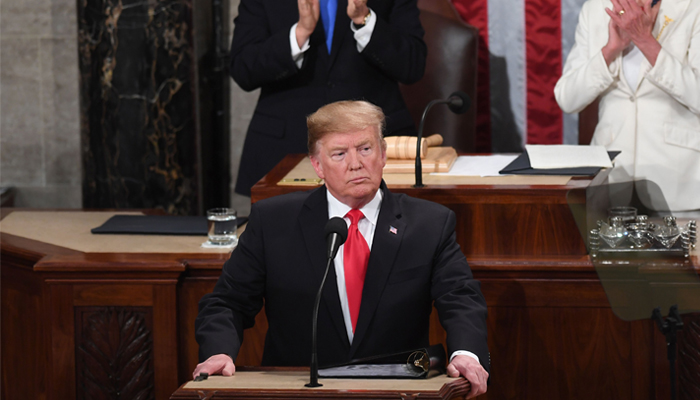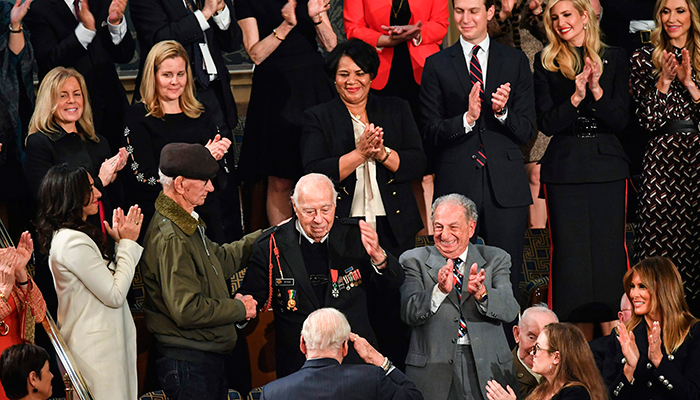Trump says talks with Taliban 'constructive'
February 06, 2019
.
.
WASHINGTON: US President Donald Trump said Tuesday that talks with Afghanistan's Taliban were making headway as he voiced cautious hope for a negotiated end to America´s longest war.
"My administration is holding constructive talks with a number of Afghan groups, including the Taliban," Trump said in his annual State of the Union address to Congress, weighing "a possible political solution to this long and bloody conflict."
"We do not know whether we will achieve an agreement — but we do know that after two decades of war, the hour has come to at least try for peace," he said.
"Great nations do not fight endless wars," Trump said, after his controversial orders to pull all US troops out of Syria and half of the 14,000-strong force in Afghanistan.
US envoy Zalmay Khalilzad in January held an unusually long six days of negotiations with Taliban representatives in Qatar. While Khalilzad has stressed that much remains to discuss, the broad goal would be for the United States to pull troops from Afghanistan and for the Taliban to ensure that foreign extremists will not be based on its territory — the reason for the US invasion after the September 11, 2001 attacks.
But the Taliban have refused to negotiate with the internationally recognized government in Kabul. Afghan President Ashraf Ghani tweeted ahead of Trump´s speech that he had spoken to Secretary of State Mike Pompeo, who "underscored the central importance of ensuring the centrality of the Afghan government in the peace process."
Trump vows to build border wall
Trump also appealed for unity among Americans in his State of the Union speech where he sought to turn the page on two years of divisive turmoil and recast himself as a bipartisan national leader.
He took a swipe at the ongoing probe of the president's possible connections to Russia, saying the "ridiculous partisan investigations" could slow down America's economic growth.
"An economic miracle is taking place in the United States, and the only thing that can stop it are foolish wars, politics, or ridiculous partisan investigations," Trump said during his speech. "If there is going to be peace and legislation, there cannot be war and investigation. It just doesn't work that way."
The American president also used his Tuesday address to call for a new era of cooperation to break "decades" of political gridlock and unlock America's promise.
"We can make our communities safer, our families stronger, our culture richer, our faith deeper, and our middle class bigger and more prosperous than ever before," Trump said.
"But we must reject the politics of revenge, resistance, and retribution — and embrace the boundless potential of cooperation, compromise, and the common good. Together, we can break decades of political stalemate."
As the speech started, he said: "The agenda I will lay out this evening is not a Republican Agenda or a Democrat Agenda. It is the agenda of the American People."

He highlighted "incredible economic success" and said he had been right to embark on a muscular new trading policy that has brought Washington and Beijing to the brink of a trade war.
And he urged his Republican Party and the opposition Democrats to work together "for a great rebuilding of America's crumbling infrastructure."
This was the "optimistic" Trump promised by White House aides.
But nothing could have been further from a unified picture in Congress, where Democrats control the House of Representatives, Republicans are in charge of the Senate, and Trump finds himself stymied at every turn.
After two years of a presidency in which Trump has driven an already polarized country into bitter, even violent debate over almost every aspect of politics, his calming words were likely to fall on many deaf ears.
'Chaos'
Just a few hours before the speech got underway, the senior Democrat in the Senate, Chuck Schumer, gave a blistering preview.
"The state of the Trump economy is failing America's middle class," Schumer tweeted. "The state of the Trump healthcare system is failing American families. The state of the Trump Administration is chaos."
Trump ripped back at Schumer for "already criticizing my State of the Union speech, even though he hasn't seen it yet."
Another tough preview was due a few minutes before the speech when Democratic Senator Kamala Harris, who has announced a challenge to Trump in the 2020 presidential election, planned a so-called "prebuttal."
Once Trump finishes, the Democrats were to field another woman, Stacey Abrams, who almost upset the odds to win Georgia's governorship, to deliver the traditional rebuttal.
Walled in
At the heart of the rancour is Trump's single-minded drive — and failure — to get congressional funding for walls along the US-Mexican border.
Trump says a wall or fence is needed to prevent an "invasion" of Central American migrants whom he repeatedly casts as a horde of killers and rapists.
Democrats accuse Trump of fearmongering and refuse to give their approval.

The resulting standoff has turned a relatively minor funding debate into an existential test of political strength in the buildup to 2020 presidential elections.
Increasingly frustrated, Trump took revenge on Congress by triggering a crippling five-week partial shutdown of government. Democratic House speaker Nancy Pelosi, who was to sit behind Trump for the State of the Union, exacted her own reprisal by forcing the speech to be delayed by a week.
Things could soon escalate, with Trump threatening to declare a national emergency so that he can bypass Congress and give himself power to take military funds for his project.
Foreign policy claims
Trump's claims to foreign policy successes are not necessarily endorsed even in his own party.
He repeated in the speech, according to the prepared text, that he wants US troops to pull out from long-running wars, such as Afghanistan and Syria as soon as possible.
"Great nations do not fight endless wars," he said.

But that has been criticized by some in the security services and many Republicans, who fear a loss of American influence on the world stage.
Trump was likewise expected to update Congress on China trade talks and on his intention to hold a second summit with reclusive North Korean leader Kim Jong Un, whom he is trying to persuade to give up nuclear weapons.
Closer to home, he dialed up the pressure on Venezuela's leftist leader Nicolas Maduro, saying "we stand with the Venezuelan people in their noble quest for freedom — and we condemn the brutality of the Maduro regime, whose socialist policies have turned that nation from being the wealthiest in South America into a state of abject poverty and despair."
"We are born free, and we will stay free. Tonight, we renew our resolve that America will never be a socialist country," he said to boisterous cheers from Republicans.
Left-leaning US lawmakers have rejected such comparisons, saying that their calls for a higher minimum wage and a more stable safety net has nothing to do with the corruption and mismanagement of Venezuela.
Opposition leader Juan Guaido's envoy to Washington was among the top guests invited to attend the speech.





